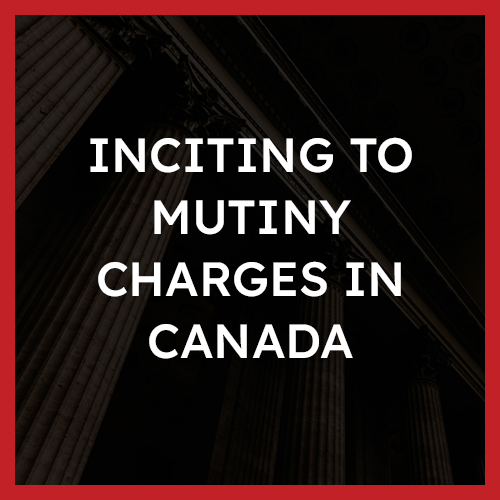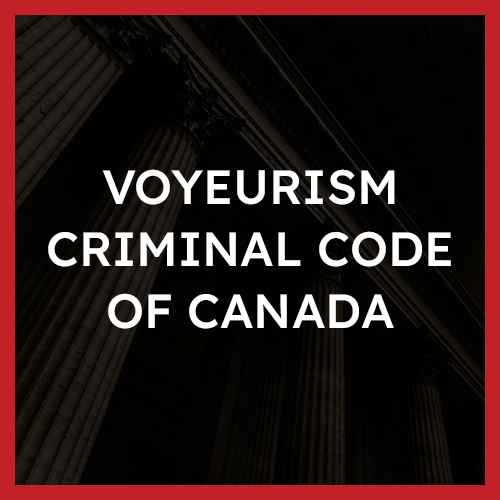Inciting to Mutiny Laws in Canada Explained
What is an inciting to mutiny charge?

An inciting to mutiny charge occurs when a person attempts for a traitorous or mutinous purpose to seduce a member of the Canadian Forces from their duty and allegiance to Her Majesty. An inciting to mutiny charge can also occur when a person attempts to incite or induce a member of the Canadian Forces to commit a traitorous or mutinous act.
Inciting to mutiny is an indictable offence and there is no Defence election under s. 469 of the Criminal Code. This offence is therefore automatically prosecuted in Superior Court.
Examples
Some examples of an inciting to mutiny charge may include the following:
- Offering bribes to members of the Canadian Forces to overthrow the government;
- Pressuring a group of Canadian Forces members to disobey their superior’s orders; and
- Radicalizing a member of the Canadian Forces and ordering them to release privileged information important to national security.
Defences
The defences available to an inciting to mutiny charge are entirely dependent on the facts of your case.
Some defences to an inciting to mutiny may include:
- The allegations made against the accused do not amount to an “attempt” to incite a mutiny;
- The accused was not the person who attempted to incite a mutiny; and
- The accused’s Charter rights were violated.
Punishment
An inciting to mutiny charge is an indictable offence, which entails a maximum punishment as follows:
- Imprisonment for a term not exceeding 14 years.
In cases of an inciting to mutiny charge, it’s important to understand the potential consequences. The maximum punishment for this offence is a substantial term of imprisonment, not exceeding 14 years, which underscores the seriousness with which the legal system views any attempt to incite to mutiny. However, there are no mandatory minimum penalties for this offence which allows the courts some flexibility to consider the unique circumstances of each case. It is important to note that if convicted of an inciting to mutiny charge, the conviction can entail severe consequences for current and future employment opportunities and immigration status.
Overview of the Offence
According to s. 53 of the Criminal Code:
53 Every one who:
(a) attempts, for a traitorous or mutinous purpose, to seduce a member of the Canadian Forces from his duty and allegiance to Her Majesty, or
(b) attempts to incite or to induce a member of the Canadian Forces to commit a traitorous or mutinous act,
is guilty of an indictable offence and liable to imprisonment for a term not exceeding fourteen years.
The Guilty Act (Actus Reus)
The actus reus for an inciting to mutiny conviction under s. 53 of the Criminal Code is established by proof, beyond a reasonable doubt, of the following:
- The accused does anything to seduce or incite members of the Canadian Forces to commit treason or mutiny, whether or not it was possible under the circumstances to incite a mutiny.
The Guilty Mind (Mens Rea)
The mens rea for an inciting to mutiny conviction under s. 53 of the Criminal Code is established by proof, beyond a reasonable doubt, of the following
- The accused had an intention to seduce or incite members of the Canadian Forces to commit treason or mutiny.
Defences
How to Beat an Inciting to Mutiny Charge
Every case is different. The availability and strength of any defence depends entirely on the specific facts of your case. The strength of any available defence rests on the evidence against you and the precise details of the allegations. However, the following are some possible defences that may be used when fighting a making an inciting to mutiny charge:
Not an “Attempt”
Inciting a mutiny is an offence which creates liability for attempting to commit an offence, regardless of if it is factually possible to commit. The Crown must prove that the accused intended to incite to mutiny, and did, or attempted to do anything for the purposes of committing that offence.
An “attempt” is defined in s. 24(1) of the Criminal Code as beyond mere preparation to commit the offence. If an accused can prove that they did not attempt to incite to mutiny, they have a strong defence against conviction.
Identity
Depending on the circumstances of your case, a possible defence to an inciting a mutiny charge may be to raise an identity defence. In this case, for this defence to be raised successfully, you will have to prove that you were not the person who attempted to incite a mutiny.
Any applicable Charter defences
The Charter sets out your rights and freedoms before and after your arrest. If the police fail to abide by these rights deliberately or inadvertently, it could aid in your defence. If any of your Charter rights have been violated before or after your arrest, you may be able to have some or all of the evidence that the Crown is relying on to secure a conviction excluded under s. 24(2) of the Charter.
Punishments
The Criminal Code provides for a possible maximum term of imprisonment of no more than 14 years for those convicted of an inciting to mutiny charge.
Upon conviction of the charge of inciting a mutiny, the sentencing provisions in Canada can vary depending on several factors, including the specific circumstances of the case. The maximum punishment for this offence is imprisonment for a term not exceeding fourteen years. However, the actual sentence imposed can be influenced by various factors, such as the severity of the act, the accused’s prior criminal history, any aggravating or mitigating factors, and the judge’s discretion. In some cases, individuals may receive a prison sentence, while in others, the court may opt for a combination of penalties, such as fines, probation, or community service, based on the principles of proportionality and rehabilitation. It is crucial to consult with legal counsel to understand the potential sentencing options and their specific application to your case, as they can significantly impact the outcome following a conviction.
Frequently Asked Questions
Can you go to jail for Inciting to Mutiny?
If you attempt to incite a mutiny under s. 53 of the Criminal Code, you can go to jail. As the maximum punishment for an inciting a mutiny charge is 14 years imprisonment, offenders of this provision have a reasonable prospect of going to jail. Whether to not the offender will go to jail will depend on a number of factors to be considered by the Court.
What is the maximum penalty for Inciting to Mutiny?
An inciting to mutiny conviction can attract sentences of up to 14 years imprisonment. Sentencing under the Criminal Code for an inciting a munity conviction will depend on what the Court will determine fair in the circumstances. What is fair will depend on several factors, including the severity of the offender’s conduct, the public interest, as well as aggravating and mitigating factors relating to the offender and offence.
Is Inciting to Mutiny an indictable offence?
Inciting to mutiny is a straight indictable offence. This means that the Crown prosecutor cannot choose to prosecute someone charged with inciting to mutiny either summarily or by indictment. The Crown prosecutor is required to proceed by indictment.
This means that the offender faces greater punishment, such as maximum prison sentences, as compared to summary or hybrid offences, in which the accused may be prosecuted either summarily or by indictment. Indictable offences tend to be more complicated in court and generally have heavier consequences on the offender.
Relevant Information
Inciting to Mutiny and Covid-19
In May of 2021, a Canadian Forces warrant officer who called on troops to refuse Covid-19 vaccine distribution faced a mutiny-related charge as he called on other military personnel to refuse to help transport and distribute the vaccines. The man spoke at an anti-lockdown protest in Toronto in full uniform and branded the vaccine as a “killer”.
The man was charged under the National Defence Act with endeavouring to persuade another person to join in a mutiny (s. 81). Although he was not charged under s. 53 of the Criminal Code, he has been called to face severe punishment for using his military rank and uniform to publicly challenge an Armed Forces’ mandate.
Though section 53 of the Criminal Code is yet to be judicially interpreted, this recent National Defence Act charge highlights the type of conduct that could potentially result in a criminal charge.
You can read the article here.
Contact Us
If you have been charged with a criminal offence, visit our location pages to contact our team.
About The Author
Ask A Question
We endeavor to respond to questions within 24 hours. If your matter is urgent, please call our office or submit a request for a free consultation.







